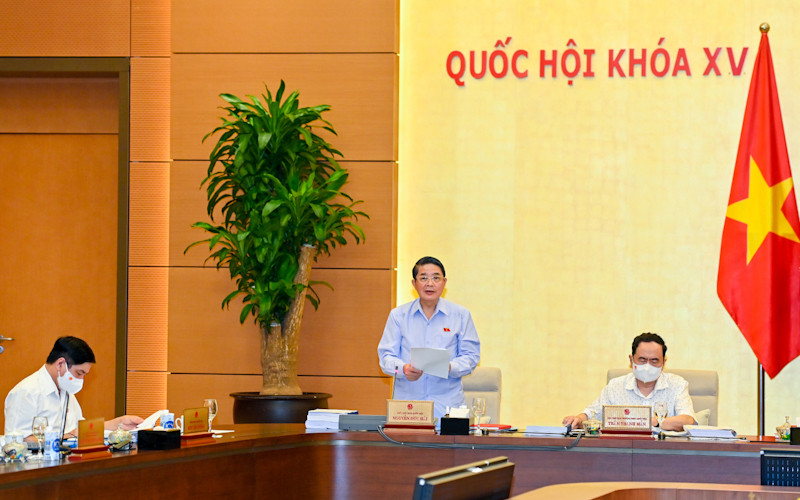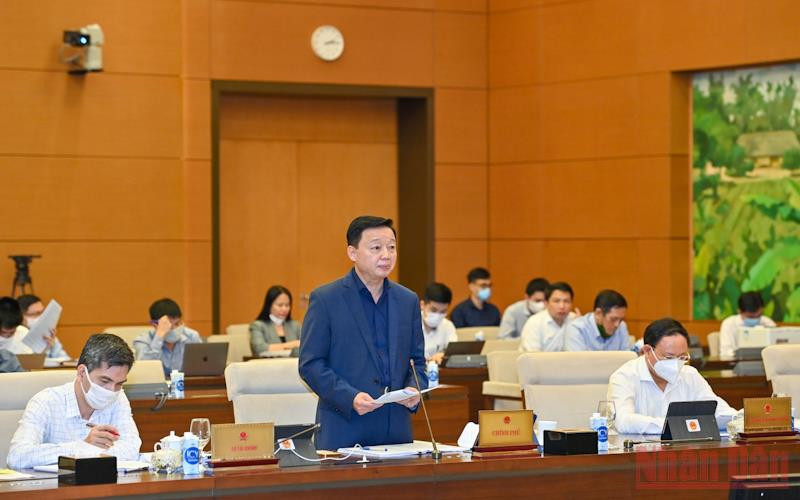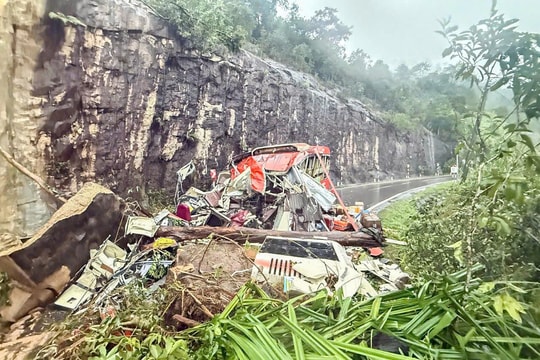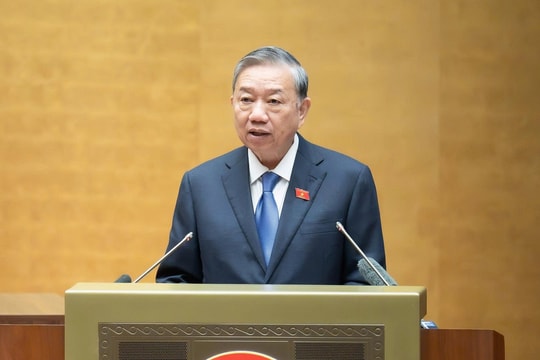Preventing loss, waste and vested interests in land use
Continuing the working program, on the afternoon of October 13, under the direction of Vice Chairman of the National Assembly Nguyen Duc Hai, the National Assembly Standing Committee gave opinions on the National Land Use Planning for the period 2021 - 2030, with a vision to 2050 and the 5-year Land Use Plan (2021 - 2025).
Delegates listened to the Minister of Natural Resources and Environment present a report; the Chairman of the National Assembly's Economic Committee presented an inspection report.
Concluding the discussion, Vice Chairman of the National Assembly Nguyen Duc Hai said: The National Assembly Standing Committee highly appreciated the Government's report and the Economic Committee's review report, and agreed that the planning dossier and land use plan were qualified to be submitted to the National Assembly.
The National Assembly Standing Committee agreed that the implementation of the Land Use Planning for the 2011-2020 period and the Land Use Plan for 2016-2020 has had positive results, achieving quite well compared to the targets decided by the National Assembly (average 85.35%).
 |
| Vice Chairman of the National Assembly Nguyen Duc Hai chaired the meeting. Photo: Duy Linh |
Exploitation and rational use of land resources
Land use planning and plans have created a legal basis and become an important tool for the State to unify land management, exploit and use land resources rationally. Land resource allocation has contributed to promoting economic development, accelerating industrialization and modernization, creating new jobs, increasing income, improving people's lives; ensuring security, national defense, food security, protecting rice-growing land area, and increasing forest cover.
In addition, the management and implementation of land use planning and plans are still inadequate and limited: The planning quality is not high, lacks uniformity, and lacks long-term vision; the allocation of some land use indicators by region is not reasonable, affecting the exploitation of potentials and advantages of each region and locality; the preparation of Land Use Plan (2016 - 2020) is very slow.
Poor planning management, planning adjustments are made many times, sometimes arbitrarily, there are still suspended planning and suspended projects affecting people's lives, causing waste of resources.
The application of science and technology to planning, land use plans, and land data information systems is still inadequate; industrial land increases rapidly but is scattered, lacking synchronization with urban planning, residential areas, land for traffic, land for parks, urban trees; land for building cultural facilities, landfill land, waste treatment is still low... Forest land area increases but natural forests decline in both quantity and quality.
The Vice Chairman of the National Assembly said: The National Assembly Standing Committee basically agrees with the viewpoints, goals, and targets of the land use planning and plan submitted to the Government and requests that the Government accept the review opinions of the Economic Committee and take note of a number of other issues.
Accordingly, land use planning is the planning of special resources (land) and must be one step ahead as the basis for sectoral planning, regional planning, and provincial planning.
 |
| Minister of Natural Resources and Environment Tran Hong Ha presents a report. Photo: Duy Linh |
Therefore, the requirements for this work in the coming time must be both specific for implementation and comprehensive, with a vision to create space for development, and at the same time must review, exchange information, and reach agreement with ministries, branches, and localities to minimize conflicts and overlaps with sectoral and regional planning, related planning, and be suitable for the development requirements of each region, each industry, and each locality.
Furthermore, it is necessary to link land use planning and plans with economic development from land resources and land finance to exploit effectively, prevent loss, waste, negativity and group interests in land use.
The national master plan is the basis for establishing the national land use plan, but currently the national master plan has not been approved. Therefore, the process of completing the land use plan and plan needs to be reviewed, compared, and discussed to limit overlap and conflict with the national master plan.
Another thing to note is to be more specific in planning and land use plans on regional and provincial connectivity, especially the connection of traffic, urban areas, and service industries in coastal provinces in planning and land use plans; for the issue of sea encroachment, it is necessary to assess socio-economic efficiency, costs and benefits, environmental impacts, prescribe criteria and determine specific locations for implementation; specifically, the bases for establishing and implementing land use plans are established by district and commune levels.
The Vice Chairman of the National Assembly said that it is necessary to ensure the quantity and quality of rice land indicators to implement the Politburo's Conclusion on food security; strictly manage the area of rice land converted to other agricultural purposes so as not to destroy the most basic characteristics of rice land, when necessary, it can be returned to rice cultivation; and minimize the conversion of rice land in areas with rice growing potential to non-agricultural purposes.
In addition, ensure effective forest planning and development, link afforestation, forest economic development with environmental protection; review industrial park land targets in line with development needs and capabilities to overcome the limitations of low occupancy rates; review and balance cultural, belief, and religious land appropriately, separate from commercial and service land.
The Government in the Proposal proposes to allow the Provincial People's Committee to change the purpose of using rice-growing land, protective forest land, and special-use forest land without having to submit to the Prime Minister for approval according to the provisions of Article 58 of the Land Law, and at the same time abolish the provisions at Point a, Clause 1, Article 58 of the Land Law.
The Vice Chairman of the National Assembly said: This is a major policy change that needs to be carefully summarized and evaluated. In the context that the Government is directing the summary of implementation to amend the Land Law, this issue should not be raised in the draft Resolution on land use planning and plans. If necessary, the Government will summarize, carefully evaluate, and submit to the National Assembly for consideration when amending the Land Law in the coming time.





.jpg)
.jpg)


